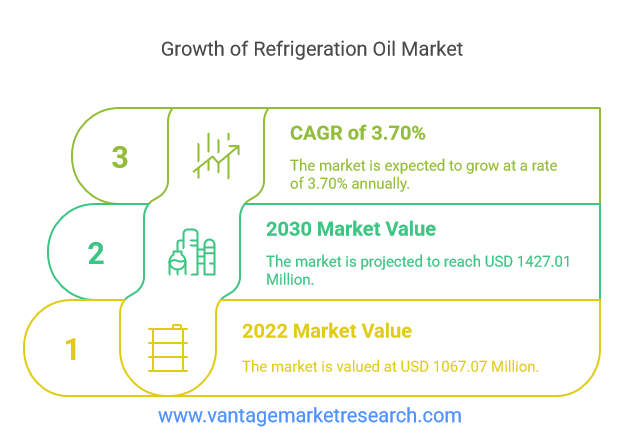The Global Refrigeration Oil Market: Trends, Dynamics, and Future Outlook
The Global Refrigeration Oil Market is poised for significant growth, with a projected increase from USD 1067.07 million in 2022 to USD 1427.01 million by 2030, reflecting a Compound Annual Growth Rate (CAGR) of 3.70%. The Vantage Market Research delves into various aspects of the refrigeration oil market, including current market size and growth projections, the influence of synthetic oils, regional demand dynamics, competitive landscape, environmental considerations, and future market trends. By exploring these facets, we aim to provide a comprehensive understanding of the refrigeration oil market and its trajectory in the coming years.
Overview of the Refrigeration Oil Market
The Refrigeration Oil Market is a critical segment of the broader cooling systems industry, serving essential functions in compressor lubrication and system efficiency. As of 2022, the market was valued at approximately USD 1067.07 million, with expectations to reach USD 1427.01 million by 2030. This growth is primarily driven by the increasing demand for refrigeration in various sectors, including food preservation, pharmaceuticals, and consumer appliances.

Key applications driving demand for refrigeration oil include air conditioning systems, refrigerators, and freezers. The rise in global temperatures and the growing need for climate control in residential and commercial spaces have further fueled the demand for efficient refrigeration systems. Additionally, the pharmaceutical industry relies heavily on refrigeration systems to maintain the efficacy of temperature-sensitive medications, thereby increasing the need for high-quality refrigeration oils.
Technological advancements are also shaping the market landscape. Innovations in refrigeration systems, such as the development of energy-efficient compressors and the integration of smart technologies, are creating new opportunities for refrigeration oil manufacturers. The shift towards synthetic oils, which offer superior performance and longevity compared to traditional mineral oils, is another trend that is expected to gain momentum in the coming years.
Growth Influence of Synthetic Oil
Synthetic refrigeration oils are gaining traction in the market due to their numerous advantages over mineral oils. One of the primary benefits of synthetic oils is their enhanced thermal stability, which allows them to perform effectively in a wider range of temperatures. This characteristic is particularly important in high-performance refrigeration systems that operate under extreme conditions.
Moreover, synthetic oils contribute to improved efficiency and equipment longevity. They reduce friction and wear in compressors, leading to lower energy consumption and extended service life for refrigeration units. This efficiency translates to cost savings for businesses and consumers alike, making synthetic oils an attractive option.
Compatibility with advanced refrigeration systems is another significant advantage of synthetic oils. As the industry moves towards more sophisticated technologies, including low-GWP (Global Warming Potential) refrigerants, the need for oils that can seamlessly integrate with these systems becomes paramount. Synthetic oils are often formulated to work effectively with these modern refrigerants, ensuring optimal performance and compliance with environmental regulations.
Regional Demand Dynamics
The refrigeration oil market is experiencing varied growth dynamics across different regions. North America and Asia-Pacific are two major regions contributing significantly to market growth. In North America, the demand for refrigeration oil is driven by the robust food and beverage industry, which relies on efficient refrigeration systems for food preservation and distribution.
In Asia-Pacific, rapid industrialization and urbanization are propelling the demand for refrigeration oils. The region’s growing middle class is leading to increased consumption of refrigerated and frozen foods, further driving the need for effective refrigeration systems. Additionally, the expansion of the pharmaceutical sector in countries like India and China is creating new opportunities for refrigeration oil manufacturers.
As urban areas continue to expand, the demand for air conditioning systems is also on the rise, particularly in developing countries. This trend is expected to further boost the refrigeration oil market as more households and businesses seek reliable cooling solutions.
Competitive Landscape and Key Players
The competitive landscape of the refrigeration oil market is characterized by the presence of several key players who are actively working to enhance their market position. Leading companies in the industry are focusing on strategies such as product innovation, strategic partnerships, and mergers and acquisitions to maintain competitiveness.
Innovations in formulation and production processes are crucial for companies looking to differentiate their products in a crowded market. Collaborations with research institutions and technology providers are also common, as companies seek to develop advanced refrigeration oils that meet the evolving needs of customers.
Furthermore, sustainability is becoming a focal point for many players in the refrigeration oil market. Companies are increasingly investing in environmentally friendly products and practices, aligning their strategies with global sustainability trends.
Environmental and Regulatory Considerations
The refrigeration oil market is significantly influenced by environmental regulations and sustainability trends. Governments worldwide are implementing stricter regulations regarding the use of high-GWP refrigerants, prompting manufacturers to shift towards low-GWP alternatives. This transition is impacting oil type preferences, as companies seek refrigeration oils that are compatible with these new refrigerants.
Sustainability trends are also driving innovation in the refrigeration oil market. Manufacturers are exploring bio-based and environmentally friendly formulations to meet consumer demand for sustainable products. As awareness of environmental issues continues to grow, companies that prioritize sustainability are likely to gain a competitive edge in the market.
Future Market Trends and Opportunities
Looking ahead, the refrigeration oil market is expected to witness several emerging trends and opportunities. One significant area of growth is the increasing application of synthetic oils in various refrigeration systems. As technology advances, the demand for high-performance oils that can enhance system efficiency and longevity will continue to rise.
Additionally, the market is likely to see developments in refrigerants, with a focus on low-GWP options that align with global sustainability goals. This shift will create new opportunities for refrigeration oil manufacturers to develop compatible products.
However, challenges such as fluctuating raw material prices and the need for continuous innovation may pose hurdles for market participants. Addressing these challenges through strategic planning and investment in research and development will be crucial for companies aiming to thrive in the evolving refrigeration oil market.
FAQs
- What is refrigeration oil and what purpose does it serve in cooling systems?
- What are the differences between mineral oil and synthetic oil in refrigeration applications?
- How does refrigeration oil contribute to the longevity and efficiency of compressors?
- What are the key properties of refrigeration oil that ensure its effectiveness in cooling systems?
![[Market Research Reports] – Research Google News Blog | VMR.Biz](https://www.vmr.biz/wp-content/uploads/2022/12/logo-removebg-preview.png)











